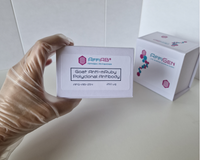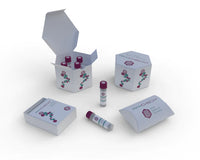AffiGEN Blog News | AffiGEN Inc.
-
Enhancing Vibrio cholerae Detection: The Role of PCR Run Controls
In recent years, the detection and monitoring of Vibrio cholerae, the causative agent of cholera, have become increasingly important in public health efforts. Polymerase chain reaction (PCR) has emerged as a powerful tool for the rapid and accurate detection of V. cholerae in clinical and environmental samples. However, the reliability and sensitivity of PCR assays heavily rely on the use of appropriate PCR run controls.
This technical article explores the significance of PCR run controls in enhancing Vibrio cholerae detection. It delves into the importance of including positive and negative controls in PCR experiments, highlighting their role in validating assay performance, identifying potential sources of contamination, and ensuring accurate and reliable results. Additionally, the article discusses the selection and optimization of PCR run controls specific to Vibrio cholerae, considering the diverse strains and genetic variations of this pathogen.
By providing a comprehensive overview of PCR run controls for Vibrio cholerae detection, this article aims to empower researchers and diagnosticians in implementing robust and quality-controlled PCR assays. The insights and recommendations presented herein can help improve the sensitivity, specificity, and reproducibility of V. cholerae detection, ultimately contributing to effective surveillance and control of this infectious disease.
-
Advances in Chlamydia trachomatis PCR Run Control: Enhancing Detection and Monitoring of Infections
This technical article explores the use of PCR run controls in the detection of Chlamydia trachomatis, a common sexually transmitted infection. By incorporating reliable run controls into laboratory protocols, researchers and clinicians can improve the accuracy and sensitivity of Chlamydia trachomatis PCR assays. The article discusses the importance of run controls, their composition, and their role in validating assay performance. It also highlights the various applications of Chlamydia trachomatis PCR run controls in diagnostic testing, research studies, and quality assurance. By implementing proper run control strategies, laboratories can enhance the reliability and confidence of Chlamydia trachomatis PCR results, contributing to improved patient care and disease management. -
Advancements in Haemophilus influenzae PCR Run Controls: Improving Detection and Monitoring
Enhance the reliability and accuracy of Haemophilus influenzae PCR-based assays with the use of Haemophilus influenzae PCR Run control. This essential control provides a reference standard for validating the performance of the PCR assay and ensuring consistent and reproducible results. By incorporating the Haemophilus influenzae PCR Run control into your laboratory workflow, you can confidently detect and monitor Haemophilus influenzae infections, enabling timely and effective management strategies. Trust in the power of quality controls to optimize the validity of your Haemophilus influenzae PCR testing and contribute to improved patient care. -
Enhancing Detection of Streptococcus pneumoniae through PCR Run Controls
The Streptococcus pneumoniae PCR Run Control is a crucial tool for ensuring the accuracy and reliability of PCR-based detection of this bacterial pathogen. This article explores the importance of incorporating a robust PCR run control in the laboratory workflow and highlights its role in verifying the performance of the PCR assay. The article discusses the design and composition of the Streptococcus pneumoniae PCR Run Control, including the use of synthetic DNA fragments or purified genomic DNA specific to the target pathogen. Furthermore, it provides insights into the implementation of the PCR run control in the laboratory, detailing the general lab protocol, including preparation, PCR reaction setup, amplification, analysis, and data interpretation. By utilizing the Streptococcus pneumoniae PCR Run Control, researchers and diagnostic laboratories can confidently validate their PCR assays, monitor assay performance, and ensure accurate detection of Streptococcus pneumoniae infections. -
Advancements in Escherichia coli (E. coli) PCR Run Controls: Enhancing Detection and Monitoring
Escherichia coli (E. coli) is a bacterium commonly found in the gastrointestinal tract of humans and animals. While most strains of E. coli are harmless, some can cause severe illnesses, including food poisoning and urinary tract infections. The accurate and timely detection of E. coli is crucial in various fields, such as clinical diagnostics, food safety, and environmental monitoring. PCR (Polymerase Chain Reaction) is a powerful molecular technique used for the specific amplification of DNA sequences, allowing for the detection and identification of E. coli.
In this technical article, we explore the use of PCR run controls for Escherichia coli (E. coli) detection. PCR run controls are essential components of PCR assays, serving as positive controls to validate the performance of the assay and ensure reliable results. We discuss the design and characteristics of E. coli PCR run controls, including the selection of target genes or genetic markers, primer design, and optimization of PCR conditions. Additionally, we provide insights into the implementation of E. coli PCR run controls in various applications, such as clinical diagnostics, food safety testing, and environmental monitoring.
By employing E. coli PCR run controls in PCR assays, laboratories can confirm the sensitivity, specificity, and accuracy of their tests. This ensures the detection of E. coli with high confidence and minimizes the risk of false-negative or false-positive results. Furthermore, we delve into the significance of using PCR run controls in different sample types, such as clinical specimens, food samples, and environmental matrices, highlighting their role in quality control and process monitoring.
Join us in this technical article as we explore the essential role of E. coli PCR run controls in accurate and reliable detection of this important bacterium. We discuss the benefits, challenges, and best practices associated with the implementation of PCR run controls, providing valuable insights for researchers, diagnosticians, and professionals working in the field of E. coli detection and monitoring.
-
Advances in Clostridium difficile (C. difficile) PCR Run Control: Ensuring Accurate Detection and Monitoring
Clostridium difficile (C. difficile) PCR Run Control: Enhancing Accuracy and Reliability in Detection Assays
Clostridium difficile infections pose a significant healthcare challenge, necessitating accurate and reliable diagnostic methods. PCR-based assays have emerged as valuable tools for C. difficile detection, offering high sensitivity and specificity. However, to ensure the quality and consistency of PCR results, the use of C. difficile PCR run controls is essential.
In this article, we explore the significance and applications of C. difficile PCR run controls in various laboratory settings. These controls serve as quality assurance measures, allowing laboratories to monitor assay performance, validate sensitivity, and detect potential variations. They are vital for training and proficiency testing, as well as research and development endeavors related to C. difficile detection methods.
Additionally, we discuss the role of C. difficile PCR run controls in outbreak investigations, surveillance programs, and external quality assurance schemes. These controls contribute to prompt and accurate detection of C. difficile infections, enabling effective response and intervention.
By incorporating C. difficile PCR run controls into diagnostic workflows, laboratories can enhance the accuracy and reliability of their C. difficile detection assays, ultimately improving patient care and public health outcomes."
This excerpt provides a brief overview of the article on C. difficile PCR Run Control, highlighting its focus on enhancing accuracy and reliability in C. difficile detection assays. It mentions the significance of using PCR run controls and outlines the applications discussed in the article, emphasizing the role of controls in quality assurance, training, research, outbreak investigations, and external quality assurance programs.
-
GMP Recombinant Proteins by AffiGen: High-Quality and Regulatory Compliance
AffiGen is a leading provider of GMP-grade recombinant proteins, catering to the diverse needs of researchers in academia and industry. Our GMP manufacturing processes adhere to stringent quality standards, ensuring reliable and consistent protein production. -
Mouse TNF-alpha Protein: Structure, Function, and Research Applications
Mouse TNF-alpha protein plays a crucial role in inflammation, immune response, and various disease processes. This article provides an in-depth exploration of its functions, detection methods, and wide-ranging applications in research. Discover protocols for protein purification, quantification, and analysis, enabling scientists to delve deeper into the mechanisms and implications of Mouse TNF-alpha in health and disease. -
Rat IL-6 Protein: Structure, Signaling, and Biological Functions
In this lab protocol, we outline the steps for purifying and quantifying Rat IL-6 protein. Rat IL-6 plays a crucial role in various physiological processes, and understanding its functions requires reliable purification methods. By following this protocol, researchers can obtain highly purified Rat IL-6 protein and perform accurate quantification. The purified protein can then be utilized for further experiments and investigations into its biological properties and interactions with other molecules. -
Rat TNF-alpha Protein: Expression, Purification, and Functional Analysis
Discover the detailed protocol for purifying Rat TNF-alpha protein, from expression to purification steps and quality control. Learn how this purified protein can be utilized in various research applications and biomedical studies. Explore the potential of Rat TNF-alpha in understanding inflammatory processes and developing therapeutic interventions. -
Characterization and Applications of Human IFN-gamma Protein: Insights into Immune Function and Therapeutic Potential
The Human IFN-gamma protein plays a crucial role in modulating immune responses and exerting anti-viral, anti-tumor, and immunomodulatory effects. This article delves into the functions and significance of Human IFN-gamma, providing insights into its involvement in various diseases. Additionally, it offers a comprehensive overview of laboratory protocols for the detection and quantification of Human IFN-gamma protein using advanced techniques such as ELISA. Whether you're studying immunology, infectious diseases, or therapeutic development, understanding Human IFN-gamma protein is essential for unraveling its complex mechanisms and exploring its therapeutic potential. -
Mouse IFN-gamma Protein: Function, Regulation, and Experimental Applications
The Mouse IFN-gamma protein plays a critical role in regulating immune responses and inflammation. Understanding its functions and detection methods is vital for researchers studying immune system dynamics and related diseases. This article dives into the intricacies of Mouse IFN-gamma, exploring its various applications and providing a detailed lab protocol for its analysis. Whether you're investigating immune pathways or developing new therapeutics, this comprehensive guide will aid in your research endeavors.



